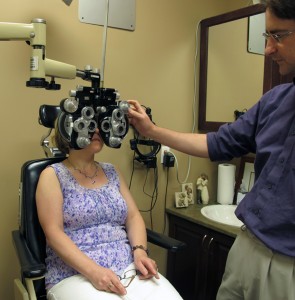By Steph Crosier
 [1]
[1]BELLEVILLE, ON (27/06/11) Dr. John Wareham gives Paula Lahey an eye exam at his offices on Sidney Street. He said eye exams are free under OHIP and recommends children should have their eyes examined at eight months. Photo by Steph Crosier
Local optometrists support a program by the McGuinty government to promote eye exams for junior kindergarteners.
The program will spread awareness to parents who may not know their children need eye exams and will also provide free glasses to those students identified as needing them. This eliminates approximately $300 in normal glasses fees.
Local MPP and provincial Minister of Education Leona Dombrowsky said that right now it’s just a pilot program but it is going very well. This September it will be expanded to 14 other school boards yet to be announced.
“This will be fully implemented in 2015,” said Dombrowsky. “We think this is an important step to enable students to be successful when they get to school.”
Dr. Jon Wareham, an optometrist in Belleville, prefers to see a child’s eyes by eight months. He said the percentage of parents bringing in their children is very low.
“If it gets the parents to get the kids in for an eye exam then yes, it is a positive thing,” said Wareham. “Anything to get those numbers up will be a benefit.”
“I guess public knowledge with these things are not always as good as we’d like them to be,” said Dr. Bernard Uhlmann, an optometrist in Trenton. “There are always improvements that can be made in these areas just to inform people.
“I think that in general, a lot of people understand, or have heard that you should take a child in at about age two to have their first eye exam. But it’s not something that is widely thought about or talked about.”
Wareham believes that because it is not included in the “parent check list” parents do not know when or if they need to bring their children in to see the optometrist.
“Parents don’t realize that they need to bring their kids in,” said Wareham. “No where along the line is there someone who has a checklist that asks: did you take your kids in for an eye exam, yes or no. They’ll do that for your dental visits, and when kids go in to junior kindergarten you have to have your shots. These things are required, but the eye exam gets forgotten about.”
Uhlmann and Wareham both said children don’t notice eye problems because they have nothing to compare their sight to.
“They can’t verbalize a problem because they have nothing to compare it too,” says Uhlmann. “They don’t know that it is a problem. It is not until they go to school usually that the kid beside them can see better or the teacher realizes, more commonly, that there is a deficiency.”
Wareham said if an eye issue is not taken care of early, a child could have other problems including reading, writing and motor skills.
Both Wareham and Uhlmann said that a lazy eye, or an amblyopic eye is the most common problem. This is when one eye is working and the other is not as well, and it can be very easily skilled over.
“With conditions like a lazy eye early intervention is very important,” said Uhlmann. “If we catch it early, than we can help them improve their vision later on, so they have better vision throughout their life.”